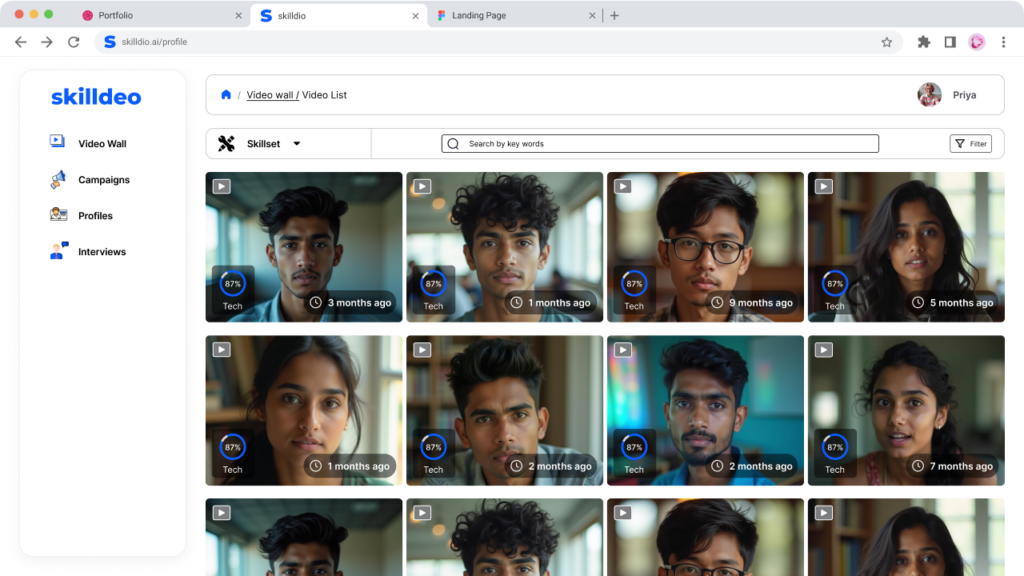In today’s world, diversity and inclusion are not just buzzwords – they are essential for organizational success. Yet, achieving true diversity often requires confronting the prejudices present in traditional hiring methods. Unconscious judgments, whether based on gender, age, race, or other factors, can often skew hiring decisions, limiting opportunities for deserving candidates. Artificial intelligence (AI), however, can play a transformative role in addressing these issues. AI interviewers, like Skilldeo, have the potential to significantly reduce these prejudices and foster a fairer hiring process.
Understanding Unconscious Judgments in Traditional Hiring
Unconscious judgments in hiring can arise from several hidden factors, such as:
- Affinity Judgment: Favoring candidates who share similarities with the interviewer, such as background or interests.
- Gender Stereotyping: Associating certain roles with specific genders.
- Name Assumptions: Making judgments based on a candidate’s name, which can be particularly problematic for ethnically diverse names.
- Confirmation Tendencies: Selecting information that aligns with preconceived beliefs about a candidate.
These tendencies can prevent companies from hiring the best talent and hinder efforts to foster diverse teams.
How AI Interviewers Address Unconscious Judgments with Skilldeo
AI interviewers, especially Skilldeo, are designed to evaluate candidates based on objective data rather than subjective impressions. Here’s how Skilldeo helps in reducing these biases:
- Anonymous Screening
Skilldeo anonymizes candidate details during the screening process, removing personal information such as name, gender, or age. This ensures decisions are made based purely on a candidate’s qualifications and abilities. - Standardized Assessments
Skilldeo uses consistent evaluation criteria across all candidates. By asking the same questions and analyzing answers uniformly, it eliminates variability that can arise in human-led interviews and ensures fairer evaluations. - Data-Driven Decision Making
Skilldeo uses advanced data analytics to assess candidates’ skills, experience, and performance metrics. By focusing on measurable data rather than subjective opinions, it helps avoid prejudices that could affect decision-making. - Real-Time Feedback and Adjustments
The AI in Skilldeo constantly monitors for potential unfair judgments in its assessments. Regular audits and system updates ensure the platform remains impartial, making it more reliable for fair decision-making. - Focus on Skills and Potential
Skilldeo evaluates candidates based on competencies and potential rather than irrelevant factors such as appearance or background. This approach identifies the best candidates, regardless of their personal details, and focuses purely on job performance.
Benefits of Reducing Unconscious Judgments in Hiring
- Improved Diversity
By promoting a fairer hiring process, Skilldeo helps organizations build more diverse teams, leading to improved creativity, innovation, and decision-making. - Enhanced Employer Reputation
Companies that prioritize diversity and inclusion, like those using Skilldeo, become more attractive to top talent and customers alike. - Better Performance
Research has shown that diverse teams perform better. A more impartial hiring process contributes to a more productive and innovative workplace. - Legal Compliance
Using Skilldeo helps ensure compliance with anti-discrimination laws, minimizing the risk of prejudice-related lawsuits and penalties.
Challenges and Limitations
While Skilldeo’s AI-driven system offers significant advantages, it is important to consider some potential challenges:
- Algorithmic Prejudices
AI is only as impartial as the data it’s trained on. If the historical data used for training contains biases, the AI system may unintentionally replicate them. Skilldeo ensures regular updates to its training data to minimize these risks. - Lack of Human Judgment
Some aspects of hiring, like cultural fit or emotional intelligence, may require human evaluation. Skilldeo’s role is to support and augment human decision-making, not replace it. - Resistance to Change
Introducing AI into the hiring process requires overcoming resistance and ensuring HR teams are educated about its benefits. Skilldeo supports organizations with training and guidance to ease this transition.
Conclusion
AI interviewers like Skilldeo represent a powerful step forward in creating fairer and more inclusive hiring practices. By removing subjective judgments and focusing on objective metrics, Skilldeo empowers businesses to build diverse teams and unlock the full potential of their workforce. However, it’s essential to recognize that AI is not a cure-all. Achieving truly impartial hiring requires a combination of AI tools and ongoing education about diversity and inclusion. Together, these efforts can help pave the way for a more equitable future in the workplace.
